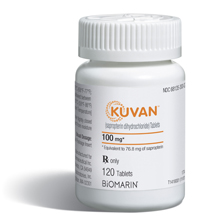Product
Kuvan
Approval Date
December 13, 2007
Release Date
December 13, 2007
Company
BioMarin Pharmaceutical
Class
Enzyme cofactor
Indication
To reduce blood phenylalanine (Phe) levels in patients with hyperphenylalaninemia (HPA) due to tetrahydrobiopterin- (BH4-) responsive Phenylketonuria (PKU). Kuvan is to be used in conjunction with a Phe-restricted diet.
Active ingredient
Sapropterin dihydrochloride; 100mg; tabs.
Agency Roster
AbelsonTaylor (professional/patient education)
Simpson Healthcare Executives (medical education)
Weisscomm & Partners (PR)
Marketing Strategy/Execution
BioMarin is taking a focused approach to marketing Kuvan, the first and only FDA-approved product to treat phenylketonuria (PKU), a rare genetic condition. Only about 30,000 people in the US have the disorder, according to the FDA, and Kuvan is only effective in 20%-50% of them.PKU, a genetic metabolic disorder, may result in mental retardation. Metabolic geneticists, and the dieticians who work with them, will be the primary targets for BioMarin’s 20-person sales force. These clinicians typically operate out of metabolic clinics, seeing both pediatric and adult PKU patients. Its second major target will be PKU patient societies. Professional channels will include medical symposia, but not journals.
“We are not spending resources any way that’s not going to deliver straight to the target,” said Sandra Shpilberg, BioMarin director of global marketing. “Journal advertising is so very diffuse.” On the patient education front, there’s Kuvan.com, and the company has a patient assistance/reimbursement support hotline. (According to BioMarin, Kuvan will cost an average of $57,000 a year.) Kuvan is indicated to reduce blood phenylalanine (Phe) levels in patients. Before Kuvan the only way to manage PKU was through a restricted diet, and the FDA stressed that patients taking the drug must continue managing their diet, as the therapeutic’s effects can be overridden by Phe intake.
Also in the Pipeline (according to Adis R&D Insight)
No competitor compounds in phase III or pre-registration, US
Recent MM&M Coverage
Compassutilizes social media for rare disease
Pharmacology
Phenylketonuria is an inborn error of metabolism that causes an accumulation of the amino acid Phe to harmful levels, causing neurological injury. In normal patients, Phe is converted to tyrosine by the enzyme phenylalanine hydroxylase. In patients with PKU, the activity of this enzyme is deficient or absent. BH4 (tetrahydrobiopterin) is a cofactor for this enzyme that is necessary for its efficient functioning; sapropterin is a synthetic version of this cofactor. Treatment with BH4 can activate residual phenylalanine hydroxylase (PAH), improve the normal oxidative metabolism of Phe, and decrease Phe levels in some patients.
The responsiveness of an individual patient to treatment with sapropterin cannot be predicted based on lab testing; only a therapeutic trial can determine if the drug is effective and appropriate for each patient. In clinical trials, about 20% to 56% of patients responded to treatment. All patients treated with sapropterin should be placed on a Phe-restricted diet, and treatment should be directed by physicians knowledgeable in the management of PKU. Neurologic damage may occur despite treatment, and both elevated and low blood levels of Phe must be avoided. In patients who are responsive to sapropterin, blood levels of Phe drop within 24 hours after a single dose, while peak effects may take up to a month.
Clinical Trials
Kuvan’s approval was based on a Phase III, multicenter, randomized, double-blind,
placebo-controlled trial of 89 patients with PKU (Levy, H., et al. “Efficacy of sapropterin dihydrochloride (tetrahydrobiopterin, 6R-BH4) for reduction of phenylalanine concentration in patients with phenylketonuria.” Lancet 2007; 370: 504–10).
Adverse Reactions
Adverse reactions: Headache, GI upset, upper respiratory infection/symptoms, throat pain, cough, fever, contusion, abdominal pain, rash; others (see literature).
Adults
=4 years: Take with food. Dissolve tablet in 4-8oz water or apple juice (may crush tab) and drink within 15 minutes (tablet may not completely dissolve). Initially 10mg/kg once daily; if inadequate response may increase to 20mg/kg once daily; if inadequate response after 1 month, discontinue. Usual range 5-20mg/kg per day; adjust based on blood Phe levels.
Children
<4 years: consult manufacturer.
Precautions
Monitor blood levels of Phe after 1 week to assess effect, then periodically. Maintain Phe-restricted diet. Hepatic or renal impairment. Pregnancy (Cat.C). Nursing mothers: not recommended.
Interactions
Caution with drugs that can inhibit folate metabolism (eg, methotrexate), PDE-5 inhibitors (e.g., sildenafil, tadalafil, vardenafil), other nitric oxide donors, levodopa.








